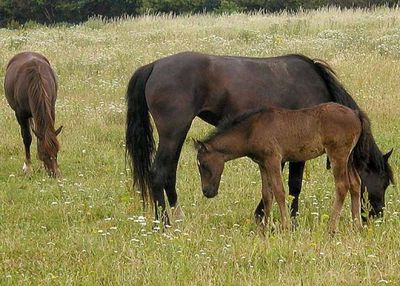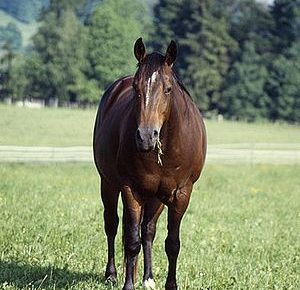
A horse suffering with colic can have a pretty painful bellyache.
First of all, don’t panic. There are things you can do to determine how serious the ailment is.
If your horse is lying down, get him on his feet. Move him to an area of green grass if possible and see if he’s interested in eating. If not, use a long line and trot him around for about 10 minutes. If your horse is down and rolling around and thrashing try to get him on his feet and walking. Be careful so that you are not injured in the process.
If the colic is mild and your horse begins eating, avoid any food that can ferment. Feed small amounts of food at several intervals. You might want the vet to check your horse too.
If after 30 minutes your horse is still not eating and appears to be in pain, call your veterinarian. Trapped stomach gases can lead to stomach torsion and you horse needs to be checked by the vet as soon as possible.
Your vet will give your horse a thorough examination. Any information about your horse’s vital signs and behavior you can give your vet will be helpful. The vet may initially treat your horse with IV fluids and pain medications. If there is no improvement or change in the horse’s condition and your vet suspects torsion, then surgery is indicated.
There are some things you can do to hopefully prevent colic:
Make sure your horse always has fresh drinking water.
Feed a high quality diet with at least 60% roughage.
Use off the ground feeders.
Ask your vet about a regular deworming program.
Have your horse’s teeth checked regularly.
Clean away manure outside at least 3 times weekly, in the stall as often as necessary daily.
Be sure to give your horse enough exercise.
Do not medicate your horse without the instructions of a veterinarian. Medications can further complicate the condition and should be administered either by the vet or with his instructions.
If your horse shows any signs of not being well, don’t hesitate, have your veterinarian examine him.

